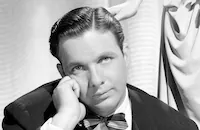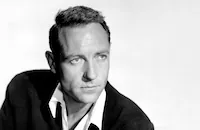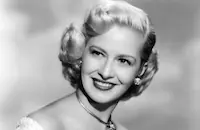Presenting Lily Mars

Brief Synopsis
Cast & Crew
Norman Taurog
Judy Garland
Van Heflin
Fay Bainter
Richard Carlson
Spring Byington
Film Details
Technical Specs

Synopsis
Nineteen-year-old Lily Mars of Midhaven, Indiana, wants desperately to become an actress and so convinces neighbor Mimi Thornway to introduce her to her son John, a Broadway theatrical producer. When John, who is in town with the touring show of his latest production, learns about Lily, however, he refuses to meet her, sure that she is just another rank amateur. Undaunted, Lily steals John's annotated copy of Let Me Dream , his next play, and then tells him that he can pick it up at her house. To John's dismay, Lily forces him to watch her mawkish rendition of "Lady Macbeth's" soliloquy before returning his script. Although John angrily advises Lily to give up her acting dreams, Lily remains determined to prove her talent. To that end, she and her youngest sister Poppy dress in rags and stand outside John's study, reciting lines from a Victorian melodrama. Lily's performance is also witnessed by Russian-born actress Isobel Rekay and Let Me Dream playwright Owen Vail, who have dropped by to see John on their way to the theater. Hearing Poppy yelling "Papa, Papa" at an annoyed John, Owen and Isobel, with whom John is romantically entangled, assume the worst. Later, when Lily crashes John's post-show party, Owen offers to help her confront the producer with his "misdeeds." John soon straightens out Owen and Isobel and begins chasing Lily around his house, determined to make good on his threat to spank her if she ever again bothered him. Lily momentarily distracts John by singing a swing number with the hired band, then agrees to leave peaceably. Before going, however, Lily informs John that he acts hostily toward her because he is afraid of his attraction to her. Despite her bravado, Lily breaks down in tears as soon as she arrives home and is comforted by her three sisters and brother. Lily's kind mother Flora, a hatmaker, then advises her to follow her dream and go to New York. By the time Lily arrives there, having hitchhiked the entire way, John is already rehearsing Let Me Dream . Lily manages to sneak into John's theater and hides out undetected until she is discovered by charwoman Frankie. Former actress Frankie confesses that she, too, came to New York as a starry-eyed youth and reassures Lily that, no matter what happens, she belongs on Broadway. The next day during rehearsal, Lily reveals herself to John when she starts dancing with the show's chorus line and faints from hunger. A suddenly sympathetic John treats Lily to lunch and allows her to remain in the chorus. After John arranges a boardinghouse for Lily, Isobel, sensing John's growing interest in the young woman, complains about the play's third act. While Owen and John are rewriting the act one night, Lily shows up at the theater and suggests her own ending. John and Owen incorporate Lily's ideas into the revised act and, despite Owen's warnings that he is getting too involved with Lily, John casts her as Isobel's maid. Two weeks later, Isobel drops by the same nightclub to which John, who is now smitten with Lily, has taken her and watches in horror as Lily imitates her on the club's stage. After a jealous Isobel quits the next day, John announces he is closing the show. Lily insists that she can take over Isobel's part, and blinded by his love for her, John agrees to cast her. Lily founders in the demanding role, however, and just before the play is to open, John reluctantly informs her that he is replacing her with Isobel, with whom he has made peace. John advises Lily not to give up, but to stay with the show in her original, modest part. Lily is crushed by John's decision and tells her family, who have come to New York to see her in her first starring role, that she is a failure. The Marses shower Lily with love and support, and to John's relief and delight, Lily makes her entrance as the maid. Sometime later, as John watches with pride, Lily makes another entrance, but this time she is a full-fledged star.

Director

Norman Taurog
Cast

Judy Garland

Van Heflin

Fay Bainter

Richard Carlson

Spring Byington

Marta Eggerth

Connie Gilchrist

Leonid Kinskey
Patricia Barker
Janet Chapman
Annabelle Logan
Douglas Croft

Ray Mcdonald
Tommy Dorsey

Bob Crosby
Six Hits And A Miss

Charles Walters
Lee Wilde
Lyn Wilde
Judy Carol
Gus Schilling
Lew Payton
William Tannen
Foncilla Adams
Marcella Holmes

Frances Rafferty
Vicky Lane

Lynne Carver

Marilyn Maxwell
Mary Alice Moore

Joe Yule
Lillian Yarbo
Almira Sessions
Cliff Danielson
Barbara Bedford
Charles Meakin
Mabel Smaney
Bryn Davis
Henry Sylvester
Harry Rosenthal
Helen Dickson
Betty Blythe
Pat West
Bill Dill
Al Murphy
Remington Olmstead Jr.
Eric Braunsteiner
Lee Murray
Milton Chisholm
Jack Vlaskin
Frank Coghlan Jr.
Bob Cautiero
Jack Chefe
Virginia Engels
Carl Leviness
Bobby Barber
Bill Cartledge

Claire Mcdowell
Crew
Albert Akst
Nacio Herb Brown
Richard Connell
Elinor Davenport
Roy Del Ruth
Roger Edens
Roger Edens
Arthur Freed
Cedric Gibbons
Muriel Goodspeed
Otto Harbach
E. Y. Harburg
Karl Hoschna
Walter Jurman
Mary Kent
Burton Lane
Gladys Lehman
Ernst Matray
Harry Mcafee
Jack Mintz
Warren Newcombe
Joseph Pasternak
Richard Pefferle
Sergei Petschnikoff
Merrill Pye
Virginia Rees
Julian Robeldo
Joseph Ruttenberg
Douglas Shearer
Shoup
Georgie Stoll
Dorothy Terriss
Bill Tuttle
Paul Francis Webster
Edwin B. Willis
Dolph Zimmer

Photo Collections
Videos
Movie Clip
Trailer
Film Details
Technical Specs

Articles
Presenting Lily Mars
MGM had originally bought the rights to Booth Tarkington's 1933 novel about a small-town girl who rises from the chorus to become a star as a vehicle for Lana Turner. But as the film's producer, recent arrival Pasternak, looked at the script, it seemed too lightweight for the glamour girl, who was being groomed for more dramatic roles. Instead, he suggested the studio add songs to make it more suitable for either Garland or Kathryn Grayson. Pasternak had tried to put Garland under contract when he was at Universal in the '30s, but when MGM decided to keep her, he snatched up another young singer the studio had just let go, Deanna Durbin. After turning Durbin into a star, he even tried unsuccessfully to borrow Garland so the two could team up (they had done the 1936 MGM short "Every Sunday" together) for a musical version of Little Women. With his move to MGM, he finally had the chance to work with Garland.
Presenting Lily Mars would give Garland one of her last juvenile roles at MGM. In some ways, it marked her coming of age on screen as she was paired romantically with adult star Van Heflin. The film also gave her one of her many on-screen musical highlights, as stage newcomer Lily realizes that the theater's cleaning lady (Connie Gilchrist) is a former star, and they duet to "Every Little Movement."
At the time, MGM was working Garland mercilessly. She was finishing shooting on For Me and My Gal (1942), with Gene Kelly, as she started musical rehearsals for Presenting Lily Mars and would start musical numbers for her next film Girl Crazy (also 1943), while completing the earlier picture.
Originally, Garland had filmed a patriotic finale for the film built around the song "Paging Mr. Greenback." When studio head Louis B. Mayer and his executives saw the rough cut, however, they thought the number didn't live up to the rest of the film. With Pasternak's approval, he assigned his resident musical genius, producer Arthur Freed, to come up with a new finale. Garland would spend three months shuttling between the sets of Girl Crazy and Presenting Lily Mars until the sequence was shot. And since the Tommy Dorsey Orchestra was already appearing in the other film, MGM recruited them for this one as well.
The result was a medley of popular classics anchored by "Broadway Rhythm," which Freed had co-written for Broadway Melody of 1936 (1935). Back then, Eleanor Powell had danced one of her quick-fire, sexy tap solos to the tune. This time out, Garland did some pretty impressive hoofing of her own, partnered by future director Charles Walters. A former chorus boy now moving into choreography, Walters had been brought to MGM at Gene Kelly's request to help with the dances on Du Barry Was a Lady (1943). When Mayer saw Walters dancing with Garland, he considered signing him as a musical star, but Freed convinced him that the dancer's career lay behind the cameras. Walters would go on to become one of the studio's top directors, working with Garland again on Easter Parade (1948).
MGM hailed the "Broadway Rhythm" finale as Garland's first appearance on screen as an adult (she actually had played a married woman who dies in childbirth in the early scenes of Little Nellie Kelly in 1940). For the big number she was decked out in an adult evening gown and appeared with her hair up for the first time on screen.
Garland's move into adulthood in Presenting Lily Mars was a case of too little too late for many critics. Although, as ever, they hailed her ability to sell a song and her effortless transitions from comic to dramatic scenes, most complained that the studio had stuck her in juvenile roles for too long. They weren't too crazy about the film either, with the New York Times critic dismissing it as "glorified monotony." The fans loved it, of course, easily pushing the picture into the profit column. The critics would have to wait a little longer for the adult Garland. She would follow Presenting Lily Mars and Girl Crazy with a character two years younger, Esther Smith in Meet Me in St. Louis (1944), before graduating to adult roles for good as the young war bride in The Clock (1945).
Producer: Joe Pasternak
Director: Norman Taurog
Screenplay: Richard Connell, Gladys Lehman
Based on the novel by Booth Tarkington
Cinematography: Joseph Ruttenberg Art Director: Cedric Gibbons, Harry McAfee
Music Director: Georgie Stoll
Principal Cast: Judy Garland (Lily Mars), Van Heflin (John Thornway), Fay Bainter (Mrs. Thornway), Richard Carlson (Owen Vail), Spring Byington (Mrs. Mars), Martha Eggerth (Isobel Rekay), Connie Gilchrist (Frankie), Leonid Kinskey (Leo), Ray McDonald (Charlie Potter), Marilyn Maxwell (Chorus Girl), Tommy Dorsey and His Orchestra, Bob Crosby and His Orchestra, Charles Walters ("Broadway Rhythm" Dance Partner).
BW-104m. Closed captioning.
by Frank Miller

Presenting Lily Mars
Quotes
Trivia
Notes
According to modern sources, M-G-M acquired Booth Tarkington's novel as a vehicle for Lana Turner. Hollywood Reporter news items add the following information about the production: George Murphy was originally cast as Judy Garland's co-star. Although Herbert Stothart was announced as Roger Edens' co-composer in July 1942, only Edens is credited onscreen. Tommye Adams tested for a part in late July 1942, and Mary Elliott, a former Miss South Carolina, was to make her screen debut in the picture, but their appearance in the final film has not been confirmed. Twins Lyn and Lee Wilde made their screen debuts in the picture. Wally Cassell and Albert Morin were announced as cast members, but were not in the final film. Saxophonist Gil Rodin, drummer Ray Bauduc, trumpeter Max Herman, trombonist Bruce Squires and clarinetist Pete Carpenter, members of Bob Crosby's band, were to be featured in the film, but their participation in the completed film has not been confirmed.
In late September 1942, principal photography was halted for several weeks while the finale was being rehearsed. That finale, which featured Garland singing "Paging Mr. Greenback" by E. Y. Harburg, Sammy Fain and Lew Brown set against a patriotic background, was reshot by Roy Del Ruth in March 1943. The new finale consisted of a medley of songs, including "Broadway Rhythm," "Three O'Clock in the Morning" and "Where There's Music." Modern sources state that the studio decided to reshoot the finale after preview audiences reacted negatively to it. CBCS lists Gerald Pierce, William Stahl and Cooper Norris in roles that were not included in the completed film, but were probably part of the original finale. According to modern sources, former Broadway dancer and future M-G-M director Charles Walters choreographed the reshot finale, as well as appearing as Garland's partner.
















